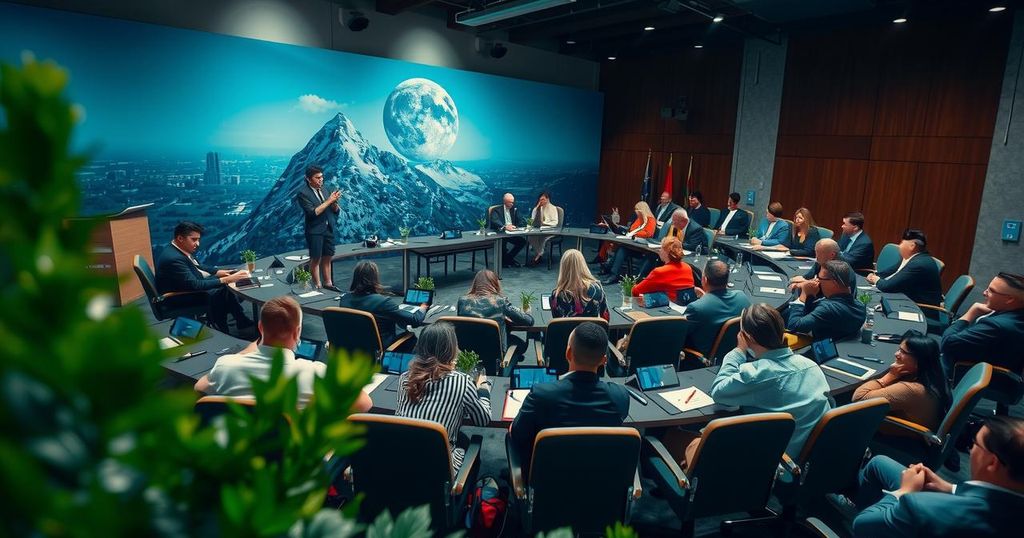As COP29 negotiations press on, wealthy nations face mounting pressure to commit nearly $1 trillion per year for climate aid to poorer countries. With limited time remaining, developing nations demand an increase from the $100 billion pledge to address climate impacts. Challenges persist as figures remain unclear, hindering meaningful progress in negotiations.
As COP29 discussions in Baku reach a critical stage, there is growing pressure on affluent nations to pledge almost $1 trillion annually in support for impoverished countries, given the urgency of addressing climate change. With only two days remaining in the negotiations, developed nations have yet to disclose their financial commitments, leaving developing nations vulnerable to the severe repercussions of climate change. These nations, which historically contribute minimally to global warming, urgently seek increased funding to adapt to environmental challenges, demanding that the longstanding pledge of $100 billion annually be significantly enhanced during COP29. Negotiators have struggled to progress, indicating that a streamlined draft will be forthcoming, ensuring a demanding night ahead. “I am sure we will have some long days and hours ahead of us… This will be a very steep climb,” remarked Wopke Hoekstra, the European Union’s climate commissioner. Colombia’s environment minister, Susana Muhamad, expressed the difficulty in expediting discussions when no definitive proposals are on the table, emphasizing the lack of a concrete figure presented by rich nations. Hoekstra elaborated that wealthy countries feel unable to propose specific amounts without clearer negotiation parameters. Developing countries, excluding China, require $1 trillion in foreign assistance by 2030 to transition away from fossil fuels and cope with increasing environmental disasters, with estimates rising to $1.3 trillion by 2035. However, wealthier nations are facing political and fiscal constraints that limit their capabilities to cover such expenses without external contributions. Notably, developing nations advocate for substantial public grants rather than loans or dependent private capital to meet anticipated financial commitments. Australia’s climate minister, Chris Bowen, highlighted three separate financial demands presented by developing nations, estimating figures of $440 billion, $600 billion, and $900 billion, which were not officially proposed by the developed countries. Bowen points to the need for clearer foundational agreements before developed nations will disclose their proposed contributions. Additionally, calls for countries like China and Saudi Arabia, categorized as developing yet affluent, to participate meaningfully in financial responsibilities have gained traction. In light of the ongoing struggles, Bolivia’s chief negotiator, Diego Pacheco, noted a diminishing expectation for an ambitious agreement, highlighting $200 billion as an insufficient target. The lead negotiator from Azerbaijan, Yalchin Rafiyev, urged all parties to adopt a collaborative and determined approach to foster a significant outcome from the conference.
The COP29 climate talks in Baku represent a critical juncture in global climate negotiations, particularly focusing on the financial support that affluent nations must extend to developing countries facing dire climate challenges. Historically, rich nations have been called upon to fulfill their obligations, particularly following a commitment to provide $100 billion annually to assist these vulnerable nations. The ongoing talks highlight the differing perspectives between wealthy and developing nations and the urgency of addressing the impacts of climate change, which disproportionately affect poorer countries that contribute the least to global emissions. The financial commitments required are becoming increasingly pressing, with many experts stressing the necessity for substantial public funding rather than reliant loans or investments.
The COP29 talks exemplify the urgent need for established financial commitments from wealthy nations to support impoverished countries combatting climate change. As negotiations stall and time runs short, the disparity between proposed funding requests and available commitments underscores the complexity of these discussions. Rich nations are tasked with reconciling domestic fiscal pressures against the global imperative to facilitate adaptation efforts in developing regions. Ultimately, successful negotiations hinge on identifying equitable contributions from all parties involved, particularly emerging economies.
Original Source: www.france24.com






